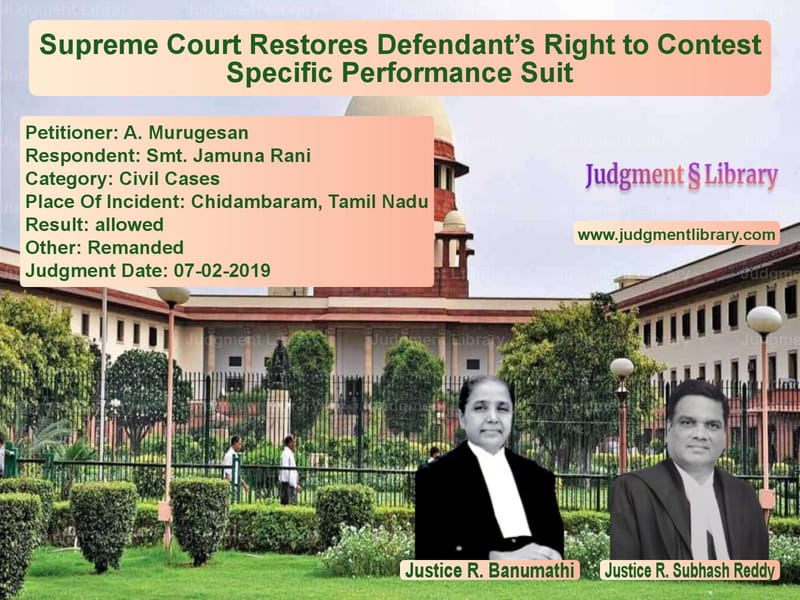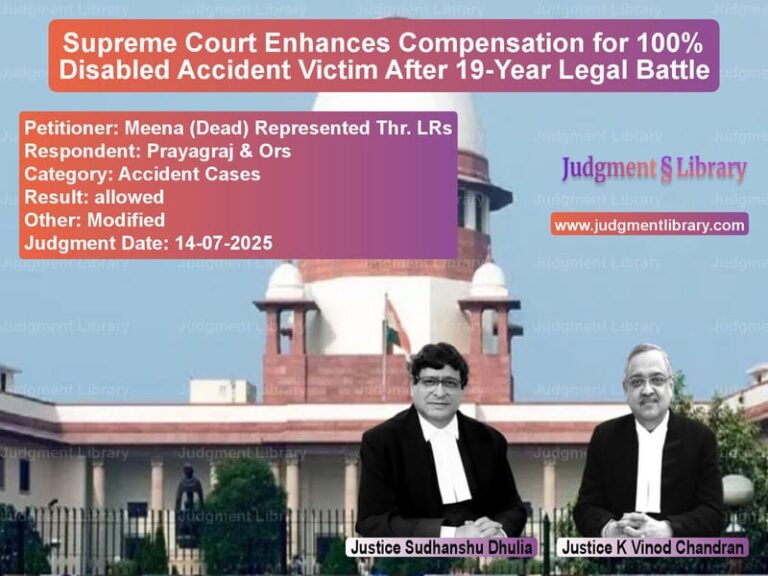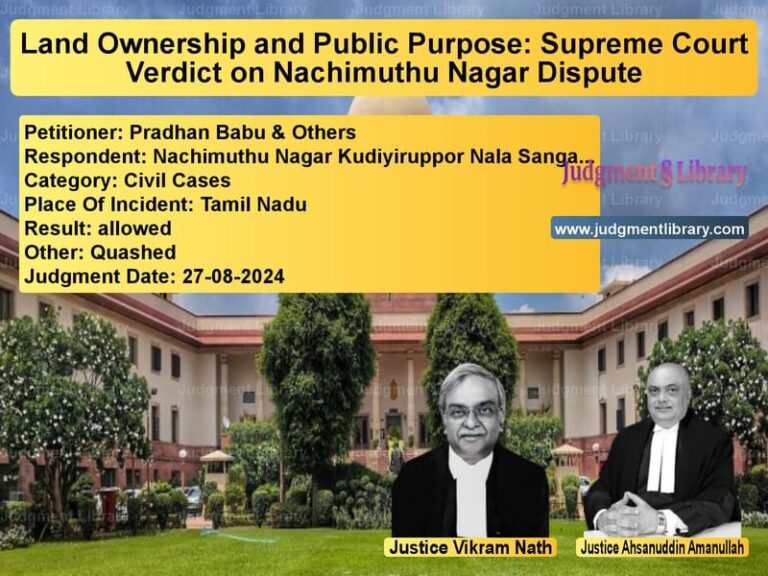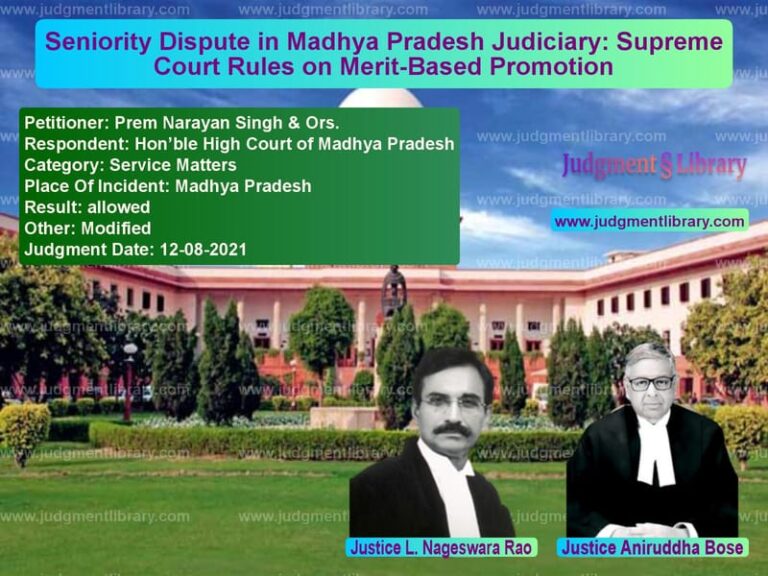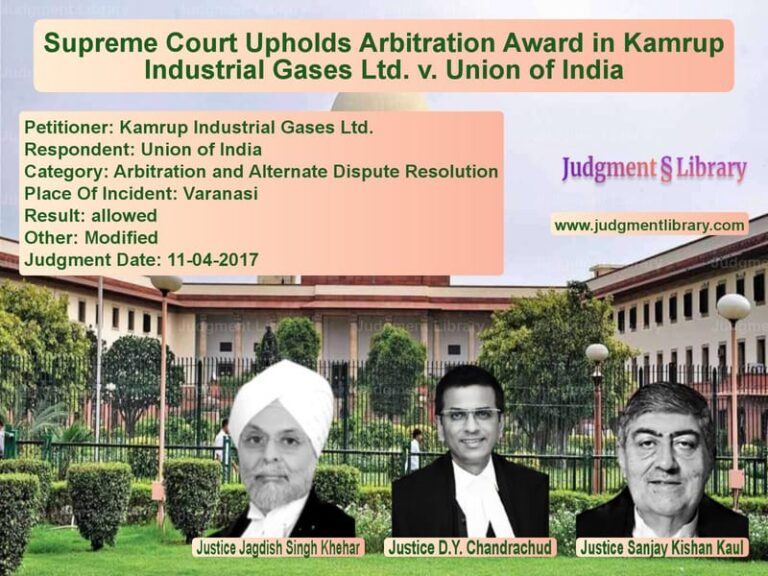Supreme Court Restores Defendant’s Right to Contest Specific Performance Suit
The case of A. Murugesan vs. Smt. Jamuna Rani deals with the issue of setting aside an ex-parte decree in a suit for specific performance of a contract. The Supreme Court examined whether the lower courts erred in dismissing the defendant’s application under Order IX Rule 13 of the Civil Procedure Code (CPC) to set aside an ex-parte decree passed against him.
Background of the Case
The dispute arose from a sale agreement dated October 11, 1995, between the appellant (defendant) and the respondent (plaintiff). According to the agreement:
- The total sale consideration was INR 3,00,000.
- The plaintiff claimed to have already paid INR 2,25,000 to the defendant.
- The plaintiff alleged that the defendant failed to execute the sale deed despite his readiness to pay the balance amount.
As a result, the plaintiff filed a suit for specific performance before the Sub-Judge, Chidambaram, in 1997. The defendant failed to appear during trial, and the Trial Court passed an ex-parte decree against him on March 16, 2009.
Defendant’s Attempt to Set Aside Ex-Parte Decree
After the ex-parte decree was passed, the defendant filed an application under Order IX Rule 13 of CPC in I.A. No. 117/2009, seeking to set aside the decree. His reasons for non-appearance included:
- Advocate Boycott: On the date of the hearing, there was a boycott of courts by advocates in Cuddalore and Chidambaram Districts, preventing his lawyer from appearing.
- Illness: The defendant himself was suffering from viral fever, making him unable to attend the proceedings.
The defendant argued that he had sufficient cause for not appearing on the hearing date and that the Trial Court erred in rejecting his application.
Lower Courts’ Rulings
The Trial Court dismissed the defendant’s application, citing his past conduct and alleged delays in litigation. The defendant then:
- Filed a Civil Miscellaneous Appeal before the Additional District Court, Chidambaram, which was dismissed on July 13, 2010.
- Challenged the ruling in a Civil Revision Petition before the Madras High Court, which was dismissed on April 17, 2014.
Petitioner’s Arguments
The defendant, Murugesan, contended:
- The lower courts erred by considering his past conduct rather than focusing on his absence on the crucial hearing date.
- The boycott of courts was an extraordinary circumstance beyond his control.
- His illness prevented him from attending, which constituted a valid reason under Order IX Rule 13 CPC.
- The dismissal of his application resulted in a miscarriage of justice as he was deprived of a fair trial.
Respondent’s Arguments
The plaintiff, Jamuna Rani, opposed the plea, arguing:
- The defendant had been delaying the case since 1997.
- The ex-parte decree was passed only after multiple opportunities had been granted.
- The defendant’s claims of illness and advocate boycott were an afterthought.
- The courts below had rightly refused to interfere with the ex-parte decree.
Supreme Court’s Observations
The Supreme Court analyzed the issue based on legal principles and precedents. It noted:
“The only aspect which is required to be considered while deciding an application under Order IX Rule 13 CPC is whether the defendant has shown sufficient cause for his absence on the date of hearing.”
The Court emphasized:
- The lower courts erred in considering the defendant’s past conduct instead of focusing on the specific cause of his absence on March 16, 2009.
- The defendant had presented two valid reasons—advocate boycott and illness—which were not properly examined.
- The trial judge’s reliance on prior delays was irrelevant in an Order IX Rule 13 CPC application.
The Court also cited the ruling in G.P. Srivastava vs. R.K. Raizada (2000) 3 SCC 54:
“An ex-parte decree passed against a defendant can be set aside upon satisfaction of the Court that either the summons was not duly served upon the defendant or he was prevented by any ‘sufficient cause’ from appearing when the suit was called on for hearing.”
Final Judgment
The Supreme Court ruled:
- The ex-parte decree was set aside.
- The application under Order IX Rule 13 CPC was allowed.
- The matter was remanded back to the Trial Court for fresh adjudication.
- The Trial Court was directed to dispose of the suit within six months to prevent further delays.
Conclusion
This judgment reaffirms the principle that an ex-parte decree should not be sustained if the defendant had a genuine reason for absence on the hearing date. The ruling ensures that litigants are not unfairly deprived of their right to contest cases due to procedural errors. By setting aside the decree and restoring the defendant’s opportunity to present his case, the Supreme Court has upheld the principles of natural justice and fair trial.
Petitioner Name: A. Murugesan.Respondent Name: Smt. Jamuna Rani.Judgment By: Justice R. Banumathi, Justice R. Subhash Reddy.Place Of Incident: Chidambaram, Tamil Nadu.Judgment Date: 07-02-2019.
Don’t miss out on the full details! Download the complete judgment in PDF format below and gain valuable insights instantly!
Download Judgment: A. Murugesan vs Smt. Jamuna Rani Supreme Court of India Judgment Dated 07-02-2019.pdf
Direct Downlaod Judgment: Direct downlaod this Judgment
See all petitions in Contract Disputes
See all petitions in Specific Performance
See all petitions in Judgment by R. Banumathi
See all petitions in Judgment by R. Subhash Reddy
See all petitions in allowed
See all petitions in Remanded
See all petitions in supreme court of India judgments February 2019
See all petitions in 2019 judgments
See all posts in Civil Cases Category
See all allowed petitions in Civil Cases Category
See all Dismissed petitions in Civil Cases Category
See all partially allowed petitions in Civil Cases Category

